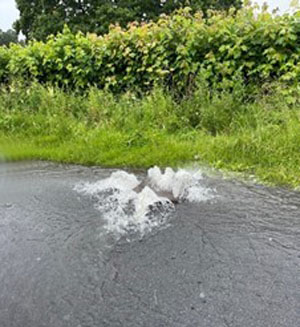Report highway and land drainage issues
Highway drainage
Herefordshire Council is the highway authority for all public roads in the county. This means we must maintain the county's drainage network to minimise the risk of flooding. We follow best practice risk-based principles as set out in the Guidance on the management of drainage assets to do this.
Report a highway drainage issue
To report issues on trunk roads or motorways in the county (A49T, A40T - Ross-on-Wye to Monmouth, and the M50), contact National Highways.
Gully cleaning
We empty, clean and maintain over 27,000 drains on public roads. We sometimes call these "gullies". You can view the gullies we are responsible for on the map below.
To help prevent floods, we carry out regular cleaning of the gullies, and where necessary we clear the connecting pipework. Gully cleaning involves removing silt from the gully pot and jetting the connecting pipes.
In an average year, our crews will clear 340 tonnes of silt and other detritus from highways drainage assets.
View our gully cleaning schedule for A and B roads in Herefordshire.
Blocked and overflowing gullies
In periods of intense rainfall, gullies can sometimes become overwhelmed by the volume of water. Underground water levels rise leaving the water with nowhere to go, giving the appearance that the drain is blocked. If a drain is overwhelmed, the water will quickly dissipate once heavy rain has passed.
If water does not drain away quickly after a spell of heavy rain, the drain may have become blocked. Drains can become blocked by mud, silt, leaves, tree roots, litter or other debris. Where this happens, you can report this and our team will undertake clearance works using high pressure water jetting so that the drainage system can adequately function again.
A blocked gully is considered an emergency when it:
- Poses a serious risk to public safety
- Is causing flooding at a property

Report flooding caused by blocked drains or gullies
Visit report a flood for details of who to call to report flooding on a highway, including blocked drains and gullies on roads.
Where flooded gullies are caused by overflowing sewers then we will raise this with Severn Trent Water or Welsh Water, who are responsible for sewer maintenance.
Ditches alongside roads are normally the responsibility of neighbouring landowners. View our ditches and drainage responsibilities page.
Drainage improvement works
Every year, the council invests in improving drainage systems to help prevent flooding. These projects can include replacing broken drainage assets or enhancing the network to better remove surface water from roads.
Projects are managed and prioritised through the asset management process and are delivered annually based on the council's available funding. The highest priority projects that can be funded within the year are selected.
We also carry out minor maintenance work on an ad hoc basis, depending on available funding.
Land drainage
Much of our county's drainage system relies upon ditches alongside the roads that are owned and maintained by local landowners (known as riparian owners).
The owner of a watercourse is legally required to maintain it so that nothing prevents it from flowing freely. Examples of watercourses include rivers, streams, culverts or ditches. In short, a watercourse or riparian owner must:
- Accept the natural flow from upstream
- Maintain the watercourse so that water can flow freely through it
The riparian owner does not need to carry out work to cater for increased flow which results from some types of works upstream, such as a new housing development.
Read more about the legal obligations of riparian owners on our ditches and drainage responsibilities page.
Map of grips and gullies for which Herefordshire Council has responsibility
